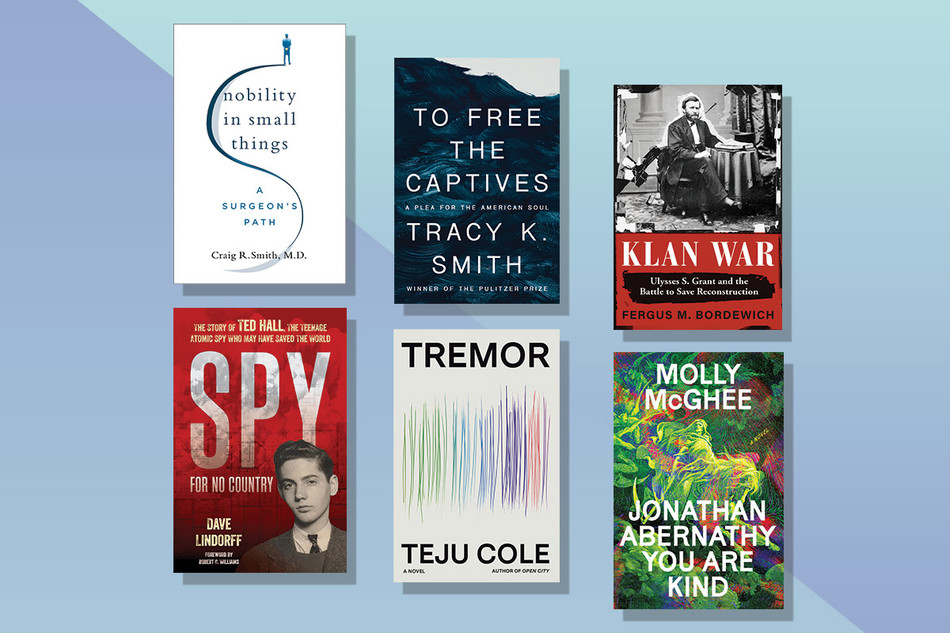Nobility in Small Things
By Craig R. Smith
As chairman of the Department of Surgery at NewYork-Presbyterian Hospital, Craig R. Smith has enjoyed a remarkable career. In fact, in 2004 he led the team that performed the quadruple bypass that saved President Bill Clinton’s life. And for most of his working years, there was a certain rhythm to his days — until COVID-19 upended the world in March 2020. With all his surgeries canceled, Smith started to write much-needed dispatches from the frontlines, first as e-mails to his staff and then as public posts on Twitter. With his first book, Smith looks back on that harrowing time and reflects on his long career in medicine, the moral convictions that ground him, and his hopes for the future.
To Free the Captives
By Tracy K. Smith ’97SOA
“I descend from a history of daily miracles,” writes Tracy K. Smith in her new book, a remarkable hybrid of family lore and American history, “by which the soul of a people whom institution upon institution has sought to annihilate yet lives on.” Despite seemingly insurmountable intergenerational oppression, Smith graduated from Harvard and Columbia and became the poet laureate of the United States. In this book, she seeks to understand and celebrate the “titanic” strength it took for her family to succeed in a world intent on seeing them fail — and she asks what the nation might learn from this resilience.
Klan War
By Fergus M. Bordewich ’77JRN
We tend to think of the KKK as a fringe group, made up of rogues and outcasts. But if we trace its roots, as journalist and historian Fergus M. Bordewich does in his riveting new book, it’s clear that that is far from true. Rather, when the Ku Klux Klan — which Bordewich calls “the first organized terrorist movement in American history” — rose to prominence after the Civil War, it was full of well-heeled members of society intent on destroying Reconstruction. Bordewich paints a vivid picture of a turbulent time, documenting the rise of the KKK and President Ulysses S. Grant’s struggle to contain it and reunite the country after a bitter war.
Tremor
By Teju Cole ’03GSAS
In the opening of Tremor — photographer, critic, and fiction writer Teju Cole’s first novel in more than twelve years — a Nigerian Harvard professor (much like Cole himself) named Tunde considers buying a West African headdress at a Maine antique shop. What, muses Tunde, makes something authentic? What is the value of “provenance”? Questions like these, of art and its role in society and of race and colonialism, permeate this gorgeous work of autofiction, which follows Tunde from New England back to Nigeria, which he sees with fresh eyes after years away.
Jonathan Abernathy You Are Kind
By Molly McGhee ’20SOA
Jonathan Abernathy is down on his luck — out of money, friends, prospects, and just about everything else — when a new government program lands him a gig as a “dream auditor.” All Abernathy has to do is enter the subconscious minds of his fellow workers and erase any unpleasant memories that might make them less productive. If Abernathy succeeds, he’s told, all his debts will be forgiven. But the title gives it away: Abernathy has too much heart for his task. Still, going along on the ride with him is great fun. Molly McGhee is herself a veteran of the dreaded cubicle — she started her career on the editorial side of publishing — and her debut novel is a biting satire of office life.
Spy for No Country
By Dave Lindorff ’75JRN
In 1944, a brilliant Harvard junior named Theodore Hall traveled to Los Alamos to work on a top-secret assignment for the US government. But Hall wasn’t just the youngest scientist recruited for the Manhattan Project. He was also the youngest Soviet spy, feeding integral information about the plutonium bomb to the Kremlin. Hall was no Soviet sympathizer, though, argues Dave Lindorff in this impeccably researched biography. Rather, he claims, Hall worried that if Americans monopolized nuclear science, the results could be catastrophic. Sharing our atomic secrets evened the playing field, and, Lindorff claims, may have saved the world as we know it.



